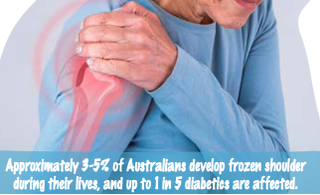|
23/6/2021 0 Comments Frozen shoulders can thawIs your shoulder painful, and are you experiencing stiffness and disability which has worsened over time? Have you been diagnosed with a frozen shoulder?Frozen shoulder, also known as adhesive capsulitis, is common. It tends to strike between the ages of 40–60 years, more so in women and people with certain underlying illness. And it can hurt! While sharp pain is experienced with extremes of motion, the usual pain is described as dull and aching.
WHAT IS FROZEN SHOULDER AND HOW DOES IT PROGRESS? Our shoulder joint is the most mobile joint in our body. Thanks to its ball and socket design, it can move forward and backward, in and out, and rotate in either direction. This provides incredible mobility. A flexible capsule surrounds the joint and holds in a lubricant called the synovial fluid. As with the engine of a car, the lubricant allows frictionless motion, reduces wear and tear, and is key to optimal function. Frozen shoulder occurs when this capsule around the shoulder joint thickens and tightens, restricting its movement and lubrication. Your shoulder starts to "stick", and pain increases while mobility decreases. This happens in stages:
WHY DOES IT HAPPEN? While there are accepted stages, a cause often remains elusive. Diabetes, heart disease, thyroid conditions, and Parkinson's disease increase the risk. It may develop after a fall or injury, or if you’re unable to move your arm, such as being in a sling or following stroke or mastectomy. Not using it may be a greater problem than overuse. This makes healthy use — and a healthy life — important for possible prevention and recovery. WHAT SHOULD I DO ABOUT IT? If you have been diagnosed with frozen shoulder, it's important to understand its natural progression; how long it will take to recuperate. Recovery can take several years, so a tailored treatment plan is essential. With this in mind, what approaches will work? Adjustments may reduce pain and improve function, and exercises and stretches that encourage motion of this joint may help. However, your chiropractor will assess and determine the most effective form of care for you. This will depend on your stage, your pain level, and the assessment findings. With the right approach, dedication and appropriate care, it’s possible to find relief and help recovery.
0 Comments
Leave a Reply. |
AuthorAdam's Back is a team of dedicated complimentary health professionals. Our aim is to support you in finding drug-free solutions for better health. Archives
July 2024
Categories |
Search by typing & pressing enter


 RSS Feed
RSS Feed